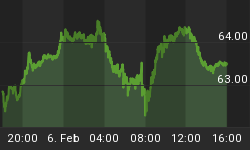Explanations for this gold selloff abound everywhere and nearly all of them are inane and incorrect. The silliest among all the reasons offered for the current bear market in gold is that Bernanke has recently morphed into a form of Paul Volker; even though he has maintained the Fed's zero percent interest rate policy and massive money printing continues unabated. His policies have, and will continue to significantly weaken the intrinsic value of the dollar--so you can just summarily dismiss that reason. Another vacuous reason to explain the drop of the gold price is that the U.S. is eventually headed towards a trade surplus. This is because some predict our energy independence in the next ten years, causing the dollar to soar sometime in the future. But the dollar fell from 83 to 82 on the DXY during the month of April, which coincided with the selloff in gold, so that can't be the reason either. In addition, our National Debt should be near $30 trillion in 10 years; and that would far outweigh any benefit for the dollar that would be gained from a potential trade surplus.
To understand the real reason behind gold's selloff, investors first need to acknowledge that it's not just gold coming under pressure. Industrial and growth stocks are plummeting across the board. For example, Caterpillar (CAT) is down 20% in the last 30 days, base-metal commodities are headed into bear market territory and copper is down 15% since February and is now trading at a over a 52-week low. Oil is also dropping sharply of late, falling down to $86 per barrel from the mid-90's a few week ago. Also, the recent stock market rally has been very narrowly based. Those equities that have been working are defensive in nature like healthcare and consumer staples...that is not representative of a healthy market. What gold is really telling us is that the global economy is on very thin ice.
So it comes down to this; investors should not make the same mistake they did during the fall of 2008, namely, ignoring the deflationary forces that are at work in certain parts of the world. Commodity bear markets aren't good for earnings if they are representative of a worldwide economic collapse. Going long equities in September of 2008 because oil was headed from $147, to $33 a barrel wasn't a very good idea. To be clear, I'm not claiming that this is at all the case today. Indeed, Japan and the U.S. are well on the way towards reaching their inflation targets. But investors should be aware that the European economy may be facing a long drawn out battle with deflation. It should be noted that deflation is a necessary circumstance when rebalancing an economy from the ravages of inflation; but in the short term is very negative for stocks. Global GDP will be weak and this will put downward pressure on stocks and commodities that are pegged to growth. However, central banks that are pursuing inflation targets should help boost precious metal prices as they guarantee a stagflationary environment in those economies.
The truth is that deflationary forces are currently very strong in Europe and, to a lesser degree, in China. This week, the IMF lowered the projection for global GDP and reduced its Eurozone GDP forecast, saying it would fall by 0.3% in 2013. Meanwhile, European car sales are approaching a 20-year low; registrations fell 10% in March to 1.35 million vehicles, the 18th consecutive monthly decline.
Major global economies and markets have become bifurcated between those that are aggressively seeking inflation and those that are embracing austerity and deflation. Japan and the U.S. are printing money at record paces, while Europe's monetary base is static. This makes investing extremely difficult at this time. Investors must be very selective in which country they place funds and be careful to avoid the trap of believing growth will accelerate later in 2013. That is why it is imperative to hold a portfolio that is diversified among countries that are pursuing inflation targets and avoid being over-exposed in sectors of the market that rely on growth.
The bottom line is the selloff in gold bullion is almost over and the vicious bear market in mining shares is soon coming to an end. Those countries that have adopted inflation targets will keep printing until they are achieved and those that have yet to state they are officially pursuing inflation goals should soon (but foolishly) join in the fight. Once all major economies are once again in sync with inflation as their goal, the investment climate will become clearer. In the meantime investors need to buckle their seatbelts because--as I have warned many times in the past--major global economies will be whipsawed between inflation and deflation until they finally crash due to bond market meltdowns.















